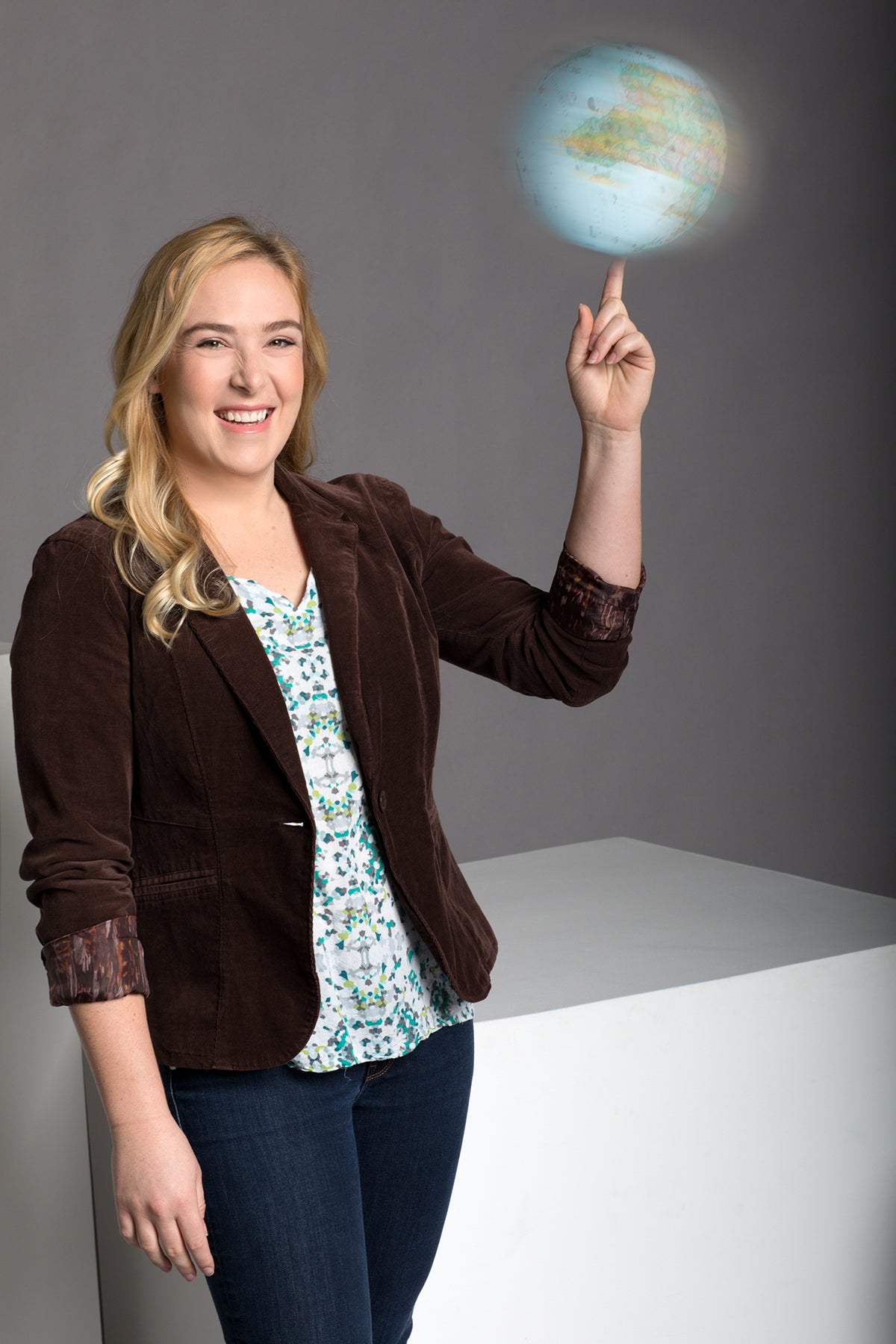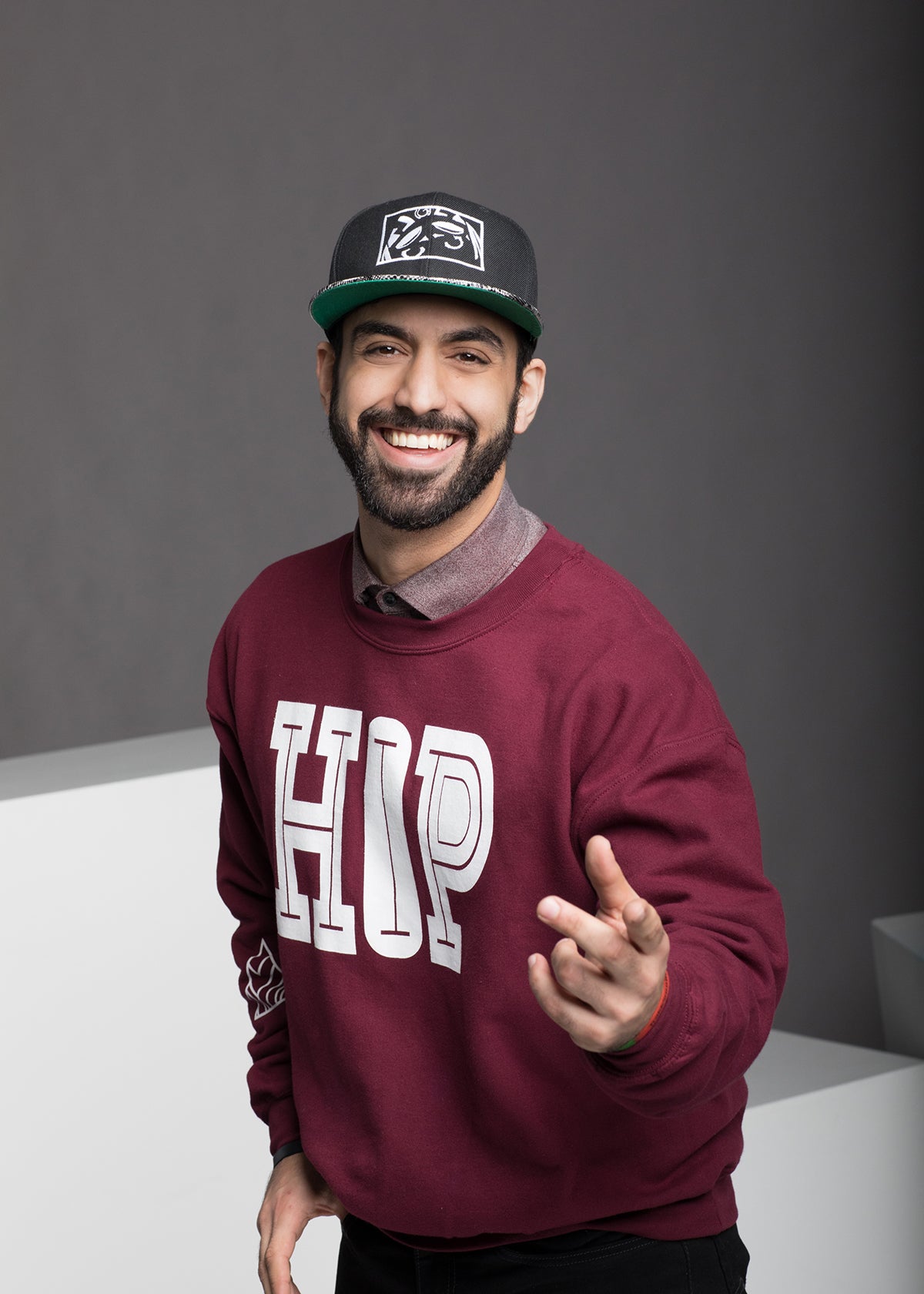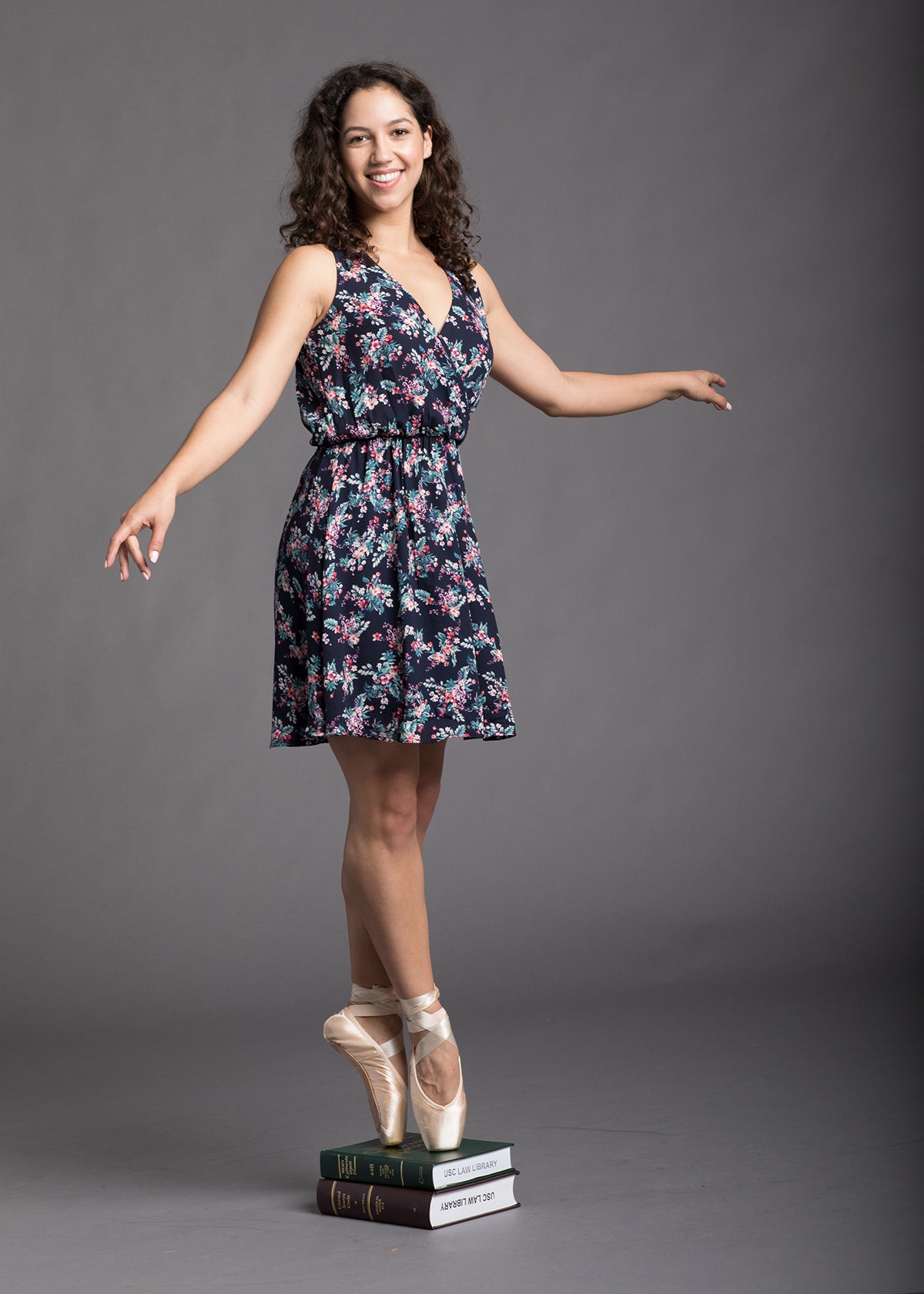Think You Know the Typical Law Student? Meet Four Who Break the Stereotypes
Four future lawyers illustrate the range of backgrounds and cultures at USC Gould.
In mid-April, as her classmates cleared their schedules for the blood-pounding sprint to finals for “1Ls” (or first-year law students), Emma Tehrani was serenely practicing her pliés, grand battements and tour jetés in weekly rehearsals with the USC Chamber Ballet Company. The student club held its spring showcase in Bovard Auditorium just weeks before Tehrani’s first final.
A classically trained dancer in law school is surely an outlier. But in some ways, Tehrani is the new normal at the USC Gould School of Law, where millennials are jettisoning stereotypes and carving out distinct pathways. Many USC Gould students entered law school this year with rich diversity of experience — they have launched businesses, pursued performance opportunities, worked on public interest campaigns or traveled the world.
Demographically, Tehrani is hardly atypical. Twenty-two, female, fresh-out-of-college. Ambitious, bright, uncertain about the future. She’s also wise and hardened by a near-death health crisis and passionate about living fully — which, for her, means practicing, performing and teaching ballet. It also means copious amounts of community service. She’s the 1L representative for four USC Gould student organizations.
“In the 1980s, the cliché was that law students were looking to go into Big Law, make partner and join a country club,” says USC Gould Dean of Students Kyle Jones ’98. “Or that they wanted careers in corporations or politics. Today, those generalizations seem absurd. This generation is reinventing who lawyers are and what we do. I predict that within a decade, the shark jokes will have disappeared from pop culture. They’re already fading.”
Cookie-cutter solutions don’t resonate with this generation, adds USC Gould Dean of Admissions David Kirschner. Their carefully curated Spotify playlists are apt metaphors for millennials’ self-image: no two the same. That ethos meshes well with USC Gould’s intimate, collegial and nurturing culture.
“We encourage and embrace our students’ desire to take charge and customize their legal training,” Kirschner says. “Gould faculty take individual students under their wings, helping them prepare for careers while staying true to themselves. That’s a big part of what separates USC Gould from peer institutions with larger classes and a more regimented approach.”
Meet four 1Ls who, in their different ways, illustrate the diversity that is embraced at USC Gould.

THERE’S A SWEETNESS TO STUART SUMMERVILLE THAT DISTINGUISHES HIM FROM MOST 1LS.
And there’s the glaring age difference, too. Summerville is only 19.
A gold cross and a “justice fist” hang around his neck, surrounded by stylish Beats headphones. His wrists are covered in Lokai beads and braided bracelets, all with special significance that he’ll gladly explain.
“This one is for Alzheimer’s awareness. This one is for the billion baby turtles. This was made by former sex trafficking victims in the Philippines.” Asked about the word tattoos on his biceps, he’ll tell you how a poem attributed to Mother Teresa inspired the one on the right. It consists of the word “Anyway” spelled out with ribboned flourishes of Summerville’s own design. A companion tattoo, the word “All,” on the left bicep, he’ll tell you, is a reminder that the things you do “anyway” can’t be pursued half-heartedly. “You need to give everything your all,” he says.
Born and raised in Indianapolis, Summerville is the youngest of four academically talented boys. His parents divorced when he was 7, but they shared custody and provided stability. Still, there were hard times, especially the times Summerville’s mom was laid off from work, and when she was recovering from surgery for colon cancer. “I’m all too familiar with welfare and government assistance programs,” he says.
Stuart and his brothers attended Park Tudor, an elite Indianapolis private school on scholarship. “My friends were extremely wealthy,” Summerville says. “They lived in mansions. My mom made a lot of sacrifices to send us there. I didn’t realize it at the time, but asking if I could go on trips to Cabo San Lucas was hard on her.”
Graduating just days after he turned 17, with a year’s worth of AP college credit under his belt, Summerville raced through Indiana University in just two years, taking the maximum course load, including summer sessions, while maintaining a 3.84 GPA. A journalism major, he’d intended to become a reporter, but as the Ferguson crisis unfolded 200 miles from Bloomington, he realized, “Reporting on the news wouldn’t be enough for me. I really wanted to change things, and I know I can do that with a law degree. I hope to use my law school education to work at the intersection of art, culture, social justice and legal awareness. My aspirations are aligned in an effort to help people understand the world around them and express and find themselves within it.”
Summerville applied to law schools, and pounced on USC Gould’s admissions offer. As a warm up, he spent last summer interning for Indianapolis law firm Taft Stettinius & Hollister. “I’m just a kid from the Midwest, so it was a little scary leaving my family,” he says. “Being so young, I was worried that I would be an outsider at law school, but I can’t say enough about how welcoming and supportive everyone has been.”
It’s OK if you don’t understand something right away. There are so many incredible professors around that you can ask. USC is great about offering help.
Stuart Summerville
Being younger than his classmates is nothing new for Summerville. He endured snarky comments and casual bullying all through secondary school because of it. At USC Gould, he’s finding that being atypical isn’t a disadvantage. “I’ve learned so much and made many friends that I think I’ll know for a lifetime,” he says. “I’m definitely glad I’m here.”
Looking out for Summerville is USC Gould Professor Ron Garet, who in addition to teaching his “Law, Language and Values” course, happens to be faculty-in-residence at Terrace, the university-owned apartment that’s home to Summerville and 60 other first-year law students.
“Stu speaks from the heart and directly from his life experience,” says Garet, who holds the Carolyn Franklin Craig Chair in Law and Religion. “I learn from him, and I know that other members of our class do, too.”

WHEN IT COMES TO ONE-OF-A-KIND 1LS, IT’S HARD TO TOP JULIE GANTZ.
The San Diego native is pursuing her legal education in reverse order.
She earned her LLM degree in 2015, and is only now following up with a JD.
That master’s degree came from the Shanghai Jiao Tong University’s KoGuan Law School. Her thesis topic: a study of river basin management comparing China’s Yellow River with the Colorado River of the American West. Her conclusion: both nations could take some pointers from the other.
Ever since Gantz was young, she has taken ownership of her education. Homeschooled through most of elementary and middle school, she loved the freedom it gave her. “I could go wherever I wanted to go. My learning was all my responsibility,” she says. As an eighth grader, she devoted a whole year to studying the Civil Rights movement. For her capstone project on the 50th anniversary of Brown v. Board of Education, she telephoned heroes of the school desegregation struggle and cajoled them into granting her long interviews. That project took first prize for her age group at the 2004 National History Day Contest.
Becoming a lawyer wasn’t an easy decision for Gantz. She seriously considered the foreign service, majoring in international politics at Georgetown University’s Walsh School of Foreign Service. She had a knack for languages. Already proficient in Spanish, she took up Mandarin in high school, and added Portuguese at Georgetown, along with a minor in Asian studies. But something about the diplomatic life made her uncomfortable. “I didn’t like the idea of not having control over where I live for a good chunk of years,” she says.
Civil rights law or environmental law seemed like attractive alternatives. “I just went for it,” she says. “I applied for jobs, scholarship opportunities. I knew I’d be happy in Shanghai.” Her Mandarin was up to the challenge, she knew, having spent the previous summer there. When the Chinese government green-lighted a scholarship to KoGuan Law School, Gantz took the plunge.
“I was the only person in the class who didn’t already have a law degree from their home country,” she says. Her classmates in the two-year LLM program came from places like North Korea, Saudi Arabia, Japan, Brazil, Argentina and the Netherlands. Instruction was in English, but Gantz pushed her Mandarin proficiency to the limit with her Yellow River field research, digging through hundreds of original government documents.
Returning to California for the Colorado River portion of her field research, Gantz landed a job in Qualcomm’s government affairs department, analyzing international patent law. These experiences cemented her decision to become a lawyer. “International law and water have my heart,” she says. “They are immediate and pressing, addressing real-world problems.”
Gantz applied to USC and was awarded the coveted 2019 Frank Rothman Scholarship and a Stanley and Ilene Gold Honors Scholarship.
“I know that taking a slightly longer and different route to law school has helped me be more confident in being here, knowing this is where I want to be,” says the 1L.
Nontraditional students like Gantz light up a classroom, says USC Gould’s Rebecca Brown. “I really enjoy the enthusiasm Julie brings,” says the constitutional law professor and holder of the Rader Family Trustee Chair in Law. “It’s a quality I often see in students with deep interests outside the walls of the law school.”

ROOSH FAEGH ISN’T EASILY FAZED.
“I’ve been through a lot,” says the 27-year-old professional hip-hop artist from Houston, Texas. Yet the first year at USC Gould has been the biggest challenge of his academic life. “They stack it on you. But I don’t let it get to me. I know what I’m capable of. And I really appreciate the supportive environment. The professors do everything they can to help you get through.”
How does a successful rapper become a law student? In the cartography of possible roads to law school, Faegh’s has to be one of the least traveled.
“Who I am today — a lot of it comes from my parents and family,” he says. As long as he can remember, Faegh has inhabited two worlds: an American one, filled with hip-hop music, and a Persian one.
“It kind of trips me out sometimes, because I wasn’t supposed to be here,” he says. Faegh’s dad came from Iran to study economics at the University of Houston in 1976. He and his wife hadn’t intended to stay, but when the Khomeinist revolution erupted back home, the young couple decided to put down roots in America. Today Faegh’s father teaches economics at Houston Community College, and his mom owns and operates a beauty salon. Their American-born children speak flawless Farsi — perfected over long summers visiting their many aunts, uncles and cousins back in Iran.
“I’ve been stuck in between cultures,” says the rapper-turned-law student.
But he could rap. His flair for freestyling had first emerged in the back of a school bus in sixth grade. By high school, he’d attracted a local following that grew as an undergrad as he started working fraternity parties at the University of Texas, Texas Tech and Oklahoma University.
It was fun, but by no means a life plan. After focusing on academics, Faegh got admitted to UT Austin, majored in corporate communications and set his sights on becoming a lawyer.
His plans were complicated by musical success. Already registered for the LSAT and taking the Kaplan prep course, his hip-hop career suddenly spiked in 2010. “I started getting booked,” he says. Faegh found himself opening in Houston clubs for up-and-coming artists like Kendrick Lamar and other future Grammy winners, pocketing $800 a night for a half-hour’s work. Dazzled, he put his legal ambition on hold.
I didn’t want to be boxed in…I have tons of other skills, and I want to add more to my arsenal.
Roosh Faegh
Four years and five albums later, his 2015 release Unorthodox debuted at No. 40 on the iTunes sales chart. Interviewed on Sirius XM’s “Sway in the Morning,” Faegh’s freestyle drew a nod of approval from the hip hop kingmaker.
“I was like, man, it’s going to go all the way,” he recalls thinking. “I’m going to go national.”
Standing at a crossroads, Faegh eyed this bright future … and decided to go to law school.
“I didn’t want to be boxed in,” he says. “I hated being categorized as ‘a rapper.’ I have tons of other skills, and I want to add more to my arsenal.”
Admitted to USC, he moved to L.A. with his longtime girlfriend and their puppy. “This is a great place to be,” he says. “The Trojan Network. USC’s links to entertainment. There should be great opportunities for me.”
It’s hard not to like Faegh, notes USC Gould’s Ron Garet, who had him in his legal reasoning course, “Law, Language and Values,” last fall.
“Soroosh is a charismatic young man with exceptional potential for leadership,” Garet says. “He’s secure enough in his identity and values to express himself candidly, vividly and frankly, so his classmates and instructors can engage with him dynamically.”

AS FOR EMMA TEHRANI, TO CALL HER A BALLERINA IS MERELY TO SCRATCH THE SURFACE OF THIS VERY UNUSUAL 1L.
For starters, the Phoenix native has a classical education that would impress John Milton. Four years of Latin and two years of ancient Greek, acquired at a top charter school, Veritas Prep, led to a merit scholarship at the University of Chicago, where Tehrani double majored in political science and psychology. She added French to her linguistic quiver, which came in handy when she interned in the Paris offices of Winston & Strawn in fall 2014.
It seemed like a really supportive community where people were trying to lift each other up rather than compete.
Emma Tehrani
Running parallel with this bookish, brainy streak in Tehrani is her passionate love of dance. Starting with ballet at 3, she later switched to Irish step dance. By 12, she was competing at the regional level before going back to ballet in her sophomore year of high school. At Chicago, she threw herself into a robust student dance community, often taking four classes a week and performing in full-length classical ballets.
“I danced in every single performance they had, except one when I was injured,” Tehrani says. Her farewell role was the Diamond Fairy in Sleeping Beauty. Backstage roles included club marketing chair, financial director and executive director.
Dance — or rather, a dance accident — has even shaped Tehrani’s legal thinking. A poorly landed jump in ballet class resulted in a fractured fifth metatarsal during her sophomore year. Tehrani stubbornly ignored it for days, determined to power through midterms on over-the-counter pain relievers. By the time she went to the ER, she was gravely ill with an undiagnosed blood disorder, idiopathic thrombocytopenic purpura, which had decimated her platelets. A series of transfusions led to life-threatening clots in her legs and lungs.
Looking back, Tehrani traces her decision to go to law school to that crisis. Were it not for the support system in place for her — college advisors, attentive parents, top physicians and excellent health insurance — she might have died. Her passion for public interest law and civil rights is rooted in this experience. “So many people don’t have that support system,” she says. Tehrani feels a deep obligation to advocate for them.
“Emma approaches legal problems not just as an abstraction but with concern for how they affect people in the world,” says Rebecca Brown, Tehrani’s Constitutional law professor. “She’s a great example of how the arts and experience with vulnerable populations can help students have a deeper and richer understanding of law.”
Today, Tehrani dances and studies hard to be a lawyer. Being at USC allows her to do both passionately and well.
All four students describe a sense of being embraced at USC Gould.
“The people here are so nice,” Faegh says. “The student body and the faculty both. Whenever I need an outline, I have so many people who are willing to send it over. It’s so much more friendly than other places. I think that’s huge.”
Sometimes reputation and reality actually converge. “Everyone talks up how collegial USC is,” Tehrani says. “I was skeptical. But when I came to visit and talked with some students, I was just amazed. It seemed like a really supportive community where people were trying to lift each other up rather than compete. And now that I’ve been here as a 1L, I can say my intuitions were correct.”
This story originally appeared in the Spring/Summer 2017 issue of USC Law Magazine.
